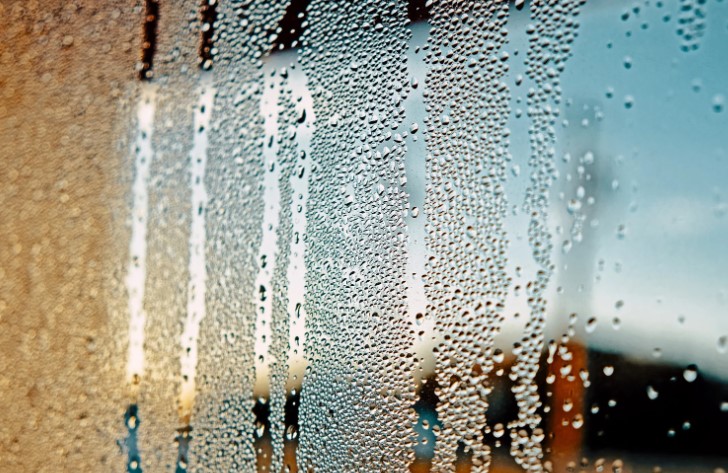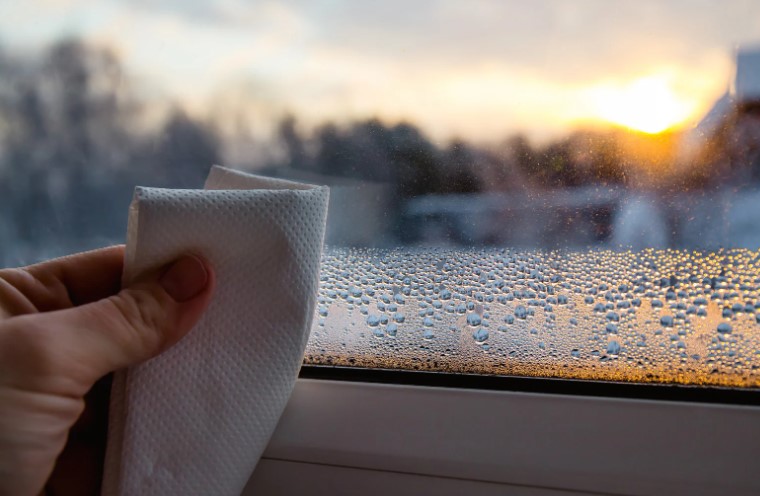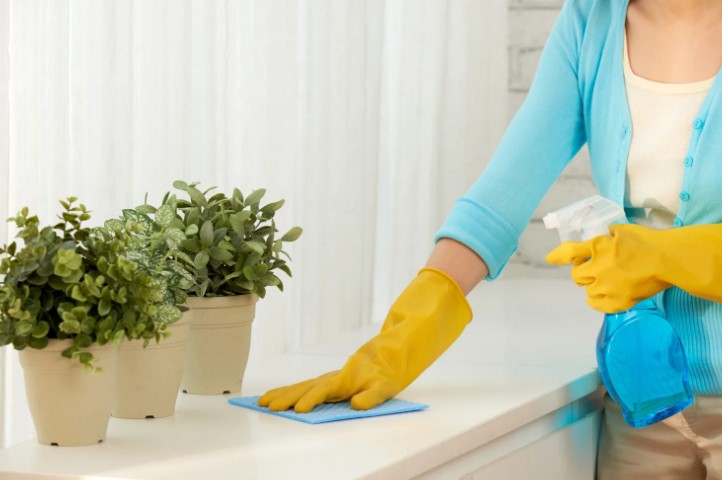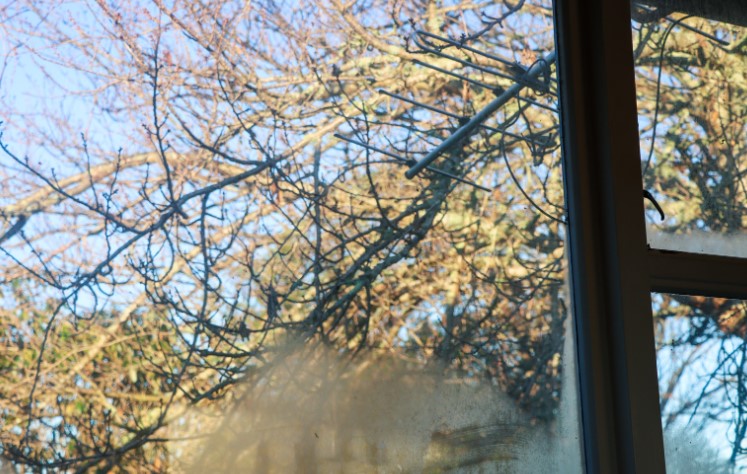- What Causes Condensation on Windows in the First Place?
- Does Vinegar Stop Condensation on Windows? – Is It True?
- How Do We Use Vinegar to Treat Condensation?
- What Are the Pros and Cons of Using Vinegar?
- What Are Some Effective Alternatives to Vinegar?
- Comparison Table: Vinegar vs Other Condensation Remedies
- Do Experts Recommend Vinegar for Condensation?
- Final Thoughts – Is Vinegar the Right Fix for Us?
- Frequently Asked Questions (FAQ) On Does Vinegar Stop Condensation On Windows
If you’re anything like us, waking up to foggy windows in the morning is all too familiar—especially during those chilly UK months.
Condensation on windows isn’t just annoying; over time, it can lead to mould, damp patches, and even damage to window frames.
Lately, we’ve seen loads of tips online on does vinegar stop condensation on windows, but is there any truth to it?
Let’s explore the facts and separate the myths from the fixes.
What Causes Condensation on Windows in the First Place?
Why do windows fog up indoors?
Condensation happens when warm, moist air inside the house meets the cold surface of the window. The water vapour turns back into liquid, forming droplets on the glass.
It’s most common in winter when there’s a big difference between indoor and outdoor temperatures.
Is condensation a sign of a bigger problem?
Sometimes yes. While a bit of fog is normal, excess condensation could point to poor ventilation, high indoor humidity levels, or insulation issues. Over time, this can encourage mould growth and rot—something we all want to avoid.
Can moisture levels in our homes affect condensation?
Absolutely. Activities like cooking, showering, or even drying clothes indoors can increase indoor humidity. Without proper air circulation, this moisture sticks around and collects on windows.

Does Vinegar Stop Condensation on Windows? – Is It True?
What’s the science behind using vinegar on windows?
White vinegar is known for its acidic properties that break down dirt and kill mould spores. While it doesn’t eliminate moisture from the air, some believe that a vinegar-based window spray can help by creating a film that repels water droplets more effectively.
How does a vinegar solution interact with moisture?
The acetic acid in vinegar may slightly reduce the surface tension on the glass, making it harder for condensation to form. However, it’s more of a temporary cleaning trick than a moisture-reducing solution.
Does vinegar reduce condensation or just clean the glass?
To be honest, vinegar is brilliant for cleaning and even preventing mould, but it won’t stop condensation from happening.
What it can do is help us maintain clean, streak-free windows that are less prone to mould build-up caused by lingering moisture.
How Do We Use Vinegar to Treat Condensation?
DIY vinegar spray recipe for window fog
Here’s a quick and easy DIY window spray using common household items.
Ingredients and Mixing Ratio
- 1 part white vinegar
- 1 part water
- A few drops of lemon juice (optional for scent)
Step-by-step application process
- Mix all ingredients in a clean spray bottle.
- Shake well before each use.
- Spray onto the inside of windows.
- Wipe using a microfibre cloth until dry.
How often should we apply vinegar on our windows?
For the best results, we recommend using the solution once a week—especially during winter when condensation is more likely.
Keep in mind this won’t solve the issue but will help keep your windows clean and mould-free.

What Are the Pros and Cons of Using Vinegar?
Pros: Natural, affordable, and widely available
- Easily found in UK supermarkets
- Environmentally friendly
- Kills surface mould and bacteria
- Leaves glass streak-free
Cons: Limitations of vinegar as a long-term fix
- Doesn’t reduce air moisture
- Has a strong smell (though temporary)
- Can damage wooden or rubber window frames if overused
Is it safe for all types of windows and frames?
Mostly yes, but we need to be cautious. While glass is fine, acidic vinegar can wear down the seals on double-glazed units or corrode wooden sills over time. Always test a small area first.
What Are Some Effective Alternatives to Vinegar?
Mechanical and ventilation solutions
- Use extractor fans in kitchens and bathrooms
- Install trickle vents on windows
- Keep a window slightly open when possible
Commercial anti-condensation sprays
These often contain surfactants or polymers that create a water-resistant layer on glass.
Home lifestyle changes to reduce moisture
- Avoid drying clothes indoors
- Use a dehumidifier in bedrooms or bathrooms
- Keep lids on pans when cooking
- Open windows for 10–15 minutes daily

Comparison Table: Vinegar vs Other Condensation Remedies
| Method | Cost | Ease of Use | Long-term Effectiveness | Eco-friendly |
| White Vinegar | Low | Easy | Limited | Yes |
| Dehumidifier | Medium | Easy | High | No (electricity) |
| Anti-condensation film | Medium | Moderate | Moderate | Yes |
| Opening windows | Free | Easy | Moderate | Yes |
Do Experts Recommend Vinegar for Condensation?
What do home improvement professionals say?
Most UK professionals agree: vinegar is not a long-term fix. It’s great for surface cleaning and may help temporarily, but to really fix condensation, we need to control the moisture in our homes.
What does science or research tell us?
Scientific sources focus more on humidity control and insulation than household hacks. Solutions like double glazing, ventilation systems, and dehumidifiers consistently rank higher in effectiveness.
When should we seek expert help?
If we’re seeing black mould, peeling paint, or condensation between double-glazed panes, it’s time to bring in a specialist. These could be signs of deeper structural or insulation issues.

Final Thoughts – Is Vinegar the Right Fix for Us?
Here’s what we’ve learned:
- Vinegar helps clean windows and can reduce mould buildup
- It doesn’t prevent condensation or change humidity levels
- It’s best used as part of a regular cleaning routine
- To truly fix condensation, we need to tackle the moisture source
✔ Key Takeaways:
- Vinegar = Cleaner glass, not drier air
- Use it weekly with care
- Pair it with real ventilation solutions for best results
Frequently Asked Questions (FAQ) On Does Vinegar Stop Condensation On Windows
1. Can I use apple cider vinegar instead of white vinegar?
Yes usage of apple cider vinegar play a vital role, but it may leave more residue and doesn’t clean as effectively.
2. Will vinegar damage window seals or rubber?
Over time, yes. Its acidity can wear down seals if used excessively.
3. How long does the vinegar effect last on windows?
A few days to a week. It’s not permanent but helps reduce mould short-term.
4. Can vinegar help prevent mould around windows too?
Definitely. Vinegar kills many types of mould spores and is great for prevention.
5. Is there a permanent fix for condensation?
Yes — better ventilation, dehumidifiers, and window insulation offer long-term results.
If you’ve been spraying vinegar and still waking up to foggy glass, don’t worry — we’ve all been there. It’s a helpful tool, but not a miracle solution. Let’s keep those windows sparkling while working on smart, long-term fixes for a drier, healthier home.


0 Comments